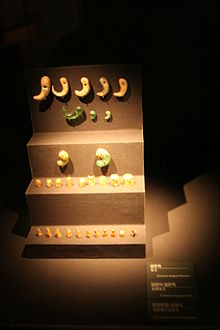Gogok
| Gogok | |
 Glass and jade beads excavated from the Tomb of King Muryeong with gold cap ornaments. | |
| Korean name | |
|---|---|
| Hangul | 곱은옥 or 곡옥 |
| Hanja | 곱은玉 or 曲玉 |
| Revised Romanization | gobeunok or gogok |
| McCune–Reischauer | kobǔnok or kokok |
Gobeunok or Gogok are comma-shaped or curved beads and jewels that appeared from prehistoric Korea through the Three Kingdoms of Korea.
Details[]
Gogok is also sometimes romanized as "kog-ok" and "kokk-ok" or "kok-ok." It is the equivalent of the Chinese pig dragon or zhūlóng from the Hongshan culture of neolithic China.[1] They are also found in Japan (Magatama) and especially in Northern Kyushu from Jōmon period populations.[citation needed][2] Although usually made from jadeite mined in Japan, they have been discovered made from many different materials such as nephrite, stone, clay, bone and glass. They range in size range from 1 to 10 centimetres (0.39 to 3.94 in), and have a small hole in the middle of the round part for threading. They were used as earrings and necklaces, and as decoration on crowns, belts, and bracelets. Some are further decorated with gold or silver attachments.
In Korea, jade gogok are found at prehistoric sites.[3] Throughout the Korean Peninsula, nephrite gogok are found inland Bronze Age sites in stone burial chambers (stone cists and dolmens). This probably indicates that gogok were symbols of prestige and power buried with the elites of society.
The most famous examples of gogok in Korean art are from the Three Kingdoms period, in the crowns of Silla, earrings, necklaces, and royal girdle of Korea. These treasures were found in the burial mounds and royal mausoleums of Silla, Baekje, and Gaya confederacy.[4]
Notes[]
- ^ "The History of Ancient Chinese Jade Culture" (PDF).
- ^ 安本, 美典 (1986). "季刊邪馬台国29号". 季刊邪馬台国. Azusa-Shoin(梓書院). 29.
- ^ magatama - Britannica Online Encyclopedia
- ^ The Fitzwilliam Museum : Catalogue Introduction Archived 2011-06-12 at the Wayback Machine
References[]
- Korea Britannica article (in Korean)
- Doosan World Encyclopedia article (in Korean)
- Yahoo Korea Encyclopedia (in Korean)
- Korean art
- Korean words and phrases
- Archaeology of Korea
- Archaeological artefact types
- Prehistoric Korea